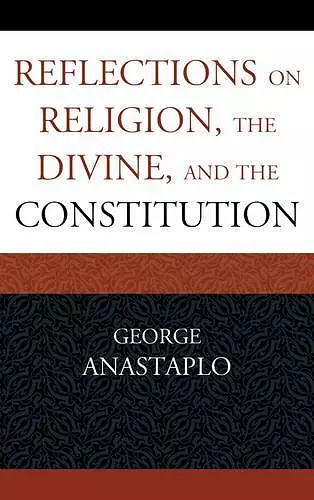Reflections on Religion, the Divine, and the Constitution
Format:Paperback
Publisher:Lexington Books
Published:25th Aug '15
Currently unavailable, and unfortunately no date known when it will be back
This paperback is available in another edition too:
- Hardback£109.00(9780739173565)

In Part One, the uses of divine revelation in the Western world are reviewed by recalling authors that include Euripides, Sophocles, Aristophanes, Plato, Maimonides, Cervantes, Hobbes, and Milton. The challenges posed by such monstrosities as Aztec human sacrifices and the Second World War Holocaust are recalled. In Part Two, the challenges of religion for and by Americans are examined. Documents such as the Declaration of Independence, the Constitution of 1787, and Presidential Farewell Addresses are recalled. The lives and thought of eminent Americans are also recalled (including George Washington, Benjamin Franklin, Thomas Jefferson, and Abraham Lincoln). Recalled as well are such movements as that of the Mormons and that of the “I Am” sect. The implications both for religious developments and for religious orthodox of modern science are investigated. The Appendices reinforce these inquiries by providing reminders of how distinguished commentators and others have tried to deal with critical questions noticed in the Essays of this book.
This work is the fifth in a proposed ten-volume set of essays that Anastaplo seeks to author. The previous volumes are Reflections on Constitutional Law (2007), Reflections on Freedom of Speech and the First Amendment (2007), Reflections on Life and Death and the Constitution (2009), and Reflections on Slavery and the Constitution (2012). The first half of the current work consists of 13 essays that run the gamut from Euripedes to Socrates and El Greco to Hobbes, with a concluding chapter on the human sacrifices by the Aztecs and Mayans. The second half examines unorthodox religious movements in the US such as the Mormons and the 'I Am' movement. Thirteen appendixes include the Declaration of Independence, the US Constitution, and a number of lesser-known essays and reflections by Anastaplo and others. Although the breadth of coverage in this work is expansive, the author ties all the topics together with religion and the divine by asking, as did Hamlet, 'Who's there?' Summing Up: Recommended. Graduate students and research faculty. * CHOICE *
Anastaplo's genius lies in his capacities for discovering interconnections linking the most disparate inquiries—in a single afternoon he may ask of a gathering of physicists why masses attract and of a survivor of Nazi imprisonment what had been the happiest day of his confinement. His "Reflections" upon replies elicited from decades of such inquiry provide guidance to thinking through the dependence of political principles upon religious belief as well as to understanding how changes in religious beliefs result from political experience. -- John Alvis, professor and director, American Studies Program, University of Dallas
No one but George Anastaplo could range so wide—from the Greek classics to contemporary unorthodox religious movements in the United States, from Aztec human sacrifices to the human problems posed by modern physical sciences—without for a moment dulling the edge of his unmistakable voice, a voice full of passion, indignation, skepticism, reason, and an unreasonable hope that the human race will not go on forever making the same stupid mistakes. Reflections on Religion, the Divine, and the Constitution, the fifth in a projected series of ten volumes of essays, is rich in insights, opinions, and disturbingly persuasive arguments. -- Wendy Doniger, Mircea Eliade Distinguished Service Professor of the History of Religions, University of Chicago Divinity School
George Anastaplo challenges us to question what we believe that we know and to recognize what our way of life depends upon. In his Reflections on Religion, the Divine, and the Constitution, he employs unexpected and unorthodox manifestations of our religious passions to make us aware of the relationship between our understanding of the divine ordering of the universe and the constitutional order under which we live. The inquiries provided through the "constitutional sonnets" of this volume offer us the opportunity to cast off the chance objects that our circumstances have provided for our religious passions and to replace them with what is truly enduring. -- Laurence D. Nee, St. John's College
ISBN: 9781498521086
Dimensions: 230mm x 157mm x 25mm
Weight: 549g
354 pages